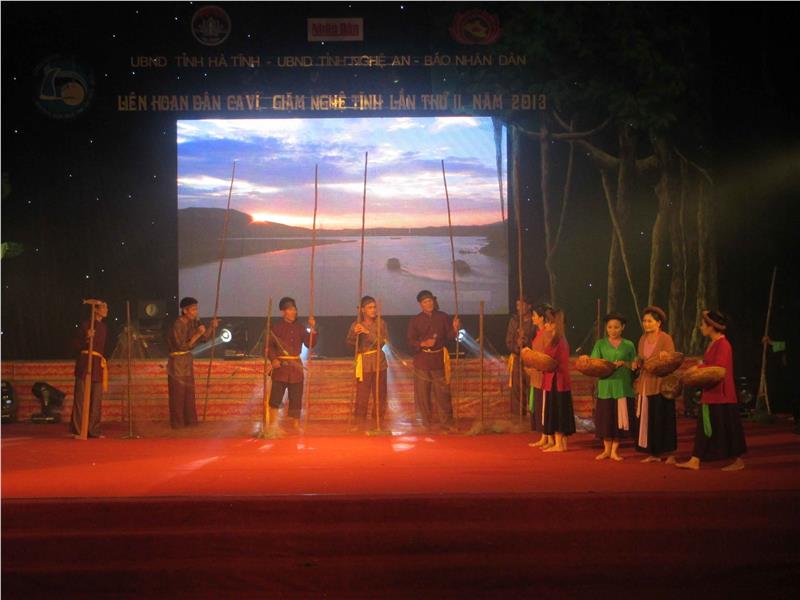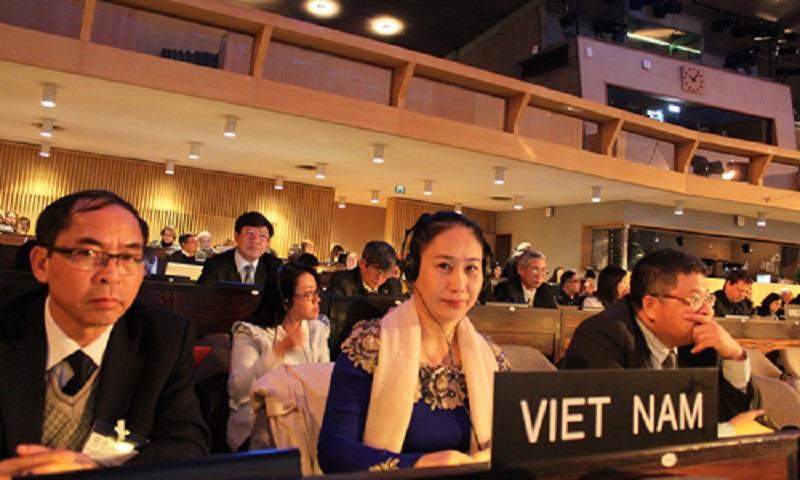On November 27th, at meeting the 9th Intergovernmental Committee for the Safeguarding of Intangible Cultural Heritage of UNESCO taking place in Paris (France), Nghe Tinh Vi-Giam folk singing was officially honored as an intangible cultural heritage of humanity by UNESCO. According to the Department of Cultural Heritage, that UNESCO nominated Vi-Giam folk singing shows the high value of this unique Vietnamese folk music. At the same time, this appreciation makes local people more responsible for preserving, teaching, encouraging young people to actively participate in learning and performing in order to preserve and promote Vi-Giam, one of intangible World Heritages in Vietnam.
Vi-Giam is a traditional folk singing without music. The singing culture has existed for hundreds of year. Vi-Giam singing is performed in working and daily life. Therefore, the singing is named after activities in daily life... The folk singing occupies an important position in the cultural and spiritual life of Nghe Tinh. It is means of art to express thoughts, feelings and enhance communication, community cohesion. According to the Intergovernmental Committee on protection of cultural heritage intangible, the nomination of the Vietnam folk culture met all the criteria for registration on UNESCO Intangible Cultural Heritage List. Among profiles, Vietnamese Vi-Giam singing received the absolute support of the judge.

On the occasion, Deputy Minister of Culture, Sports and Tourism, Dang Thi Bich Lien said that this was a decision having a great significance to Vietnam as a kind of folk singing in Nghe An and Ha Tinh sticking with daily activities relating to traditional Vietnamese culture such as farming, making crafts, sailing, and fishing... honored by UNESCO. The Deputy Minister shared that Vi-Giam folk singing plays an important role in cultural and spriitual life of people in Nghe Tinh. It reflects cultural identity of local people inherits from generations and promotes in daily life. Locals sing Vi-Giam folksongs to share, communicate, exchange common concerns of community, and to create closeness among the community. He also affirmed that Vietnam acknowledges Vi Giam Nghe Tinh had become the cultural heritage of humanity. Vietnam commits to implement the program of action to preserve the vitality of this cultural feature, and develop policies to honor artists to practice, transmit and educate the younger generation. The opinion also shared by the leaders of Nghe An and Ha Tinh. Mr. Nguyen Thien, Deputy Chairman of the Standing Committee of Ha Tinh People's Committee, and Mrs. Dinh Thi Le Thanh, Deputy Chairman of the People's Committee of Nghe An, expressed emotion and pride for the recognition which contributed to the richness and diversity of intangible cultural heritage of humanity.

Representatives of the two provinces' leaders are well aware of great responsibility as well as the need to set up specific plans to continue preserving and promoting the values of heritage, especially propagandas of advertising to the people and government at all levels to deeper awareness of the value. This also makes Vi-Giam singing become longer-lasting and positively contribute to the development cultural identity as well as the sustainable development of Nghe An and Ha Tinh. Mr. Tran Quang hai, music expert said that he was so proud that after Quan Ho singing, Xoan singing, and Don Ca Tai Tu singing, Vi-Giam singing was nominated by UNESCO. According to the expert, Vi-Giam singing has lyrics as folk poetry, a form of response associated with daily activities such as singing on La River and singing when boating. The lyrics express unique feature in poetry of Vietnam, ie Alexandrine. Many rhythms of Vi-Giam folksongs exude music and rich tone, showing the richness of Vietnamese folksongs.
At the 9th meeting, Intergovernmental Committee of UNESCO Convention recognized 34 intangible cultural heritages among 46 nominations. Besides Vi- Giam, UNESCO has recognized Nongak performance (Korea), Ebrui (Turkey), Askiya (Uzbekistan), traditional steam bath Võru (Estonia), and Al-Zajal (Lebanon), etc. So far, 314 art forms have been honored around the world for this category.
